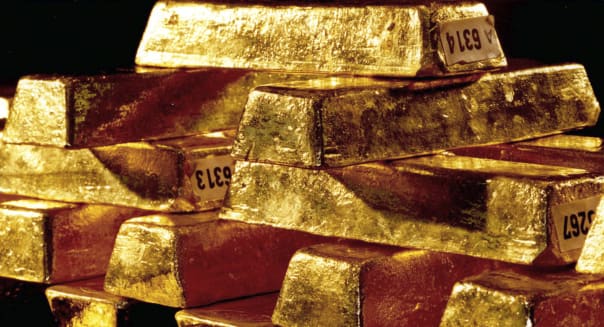Filed under: Federal Reserve, Alternative Investment, Commodities & Futures, World Markets, Investing

LONDON -- Gold rose Friday ahead of a series of speeches by U.S. Federal Reserve officials but was still on track for its biggest weekly fall since November following the Fed's hints of an interest rate hike in the first half of 2015.
Fed officials including Richard Fisher, James Bullard and Narayana Kocherlakota are due to speak later Friday after Fed Chair Janet Yellen surprised markets mid-week by suggesting the possibility of raising interest rates early next year.
Spot gold was up 0.6 percent to $1,336.40 an ounce by 1508 GMT (11:08 a.m. Eastern time), after falling to $1,320.24 on Thursday, its weakest since end-February.
U.S. gold futures gained 0.5 percent to $1,336.80 an ounce.
On Monday bullion briefly touched a six-month high of $1,391.76 on tensions in Ukraine and concerns about growth in China before the focus shifted towards the U.S. monetary stance. It was on course for a 3.1 percent weekly fall.
"After the Fed policy meeting we saw gold fall and touch support around $1,320," MKS SA head of trading Afshin Nabavi said.
"But with tensions again escalating between Russia and the West, the market has become more jumpy because it is not only the macroeconomics driving prices but also the political situation, at least in the short term."
European and U.S. shares edged higher, while the dollar hovered near a three-week high against a basket of major currencies and 10-year U.S. Treasury yields rose above 2.7 percent.
"The main longer-term factors remain expectations for higher yields, higher interest rates and a stronger dollar, which are negative for the metal,"
Low interest rates, which cut the opportunity cost of holding non-yielding bullion above other assets, had been a key factor driving bullion higher in recent years.
An escalation of U.S. sanctions against Russia over the crisis in Crimea kept investors cautious, giving support to gold, usually seen as an insurance against risk, analysts said.
U.S. President Barack Obama raised the stakes in the East-West confrontation on Thursday by targeting some of Russian President Vladimir Putin's closest long-time political and business allies with personal sanctions.
Physical Buying
The physical sector noted light buying from jewelers, but demand from main consumer China remained slow because of a weak yuan. Premiums for gold bars in Hong Kong were unchanged from last week at $1 an ounce to the spot London prices.
China's yuan fell to a 13-month low on Friday and was set to post its biggest weekly fall after the central bank lowered the midpoint of its permitted trading range, which is seen as a signal of official comfort with the currency's recent losses.
Weakening differentials between 99.99 percent purity gold on the Shanghai Gold Exchange and cash gold discouraged imports.
"Shanghai gold exchange is still at discounts to spot gold, and the market wants to know if the yuan will continue to depreciate," a physical dealer in Hong Kong said.
Gold jewellery exports from India edged up 1 percent in February to $718.36 million from a year earlier, an industry body statement said on Thursday.
In other precious metals, palladium rose 4 percent to $795.00 an ounce, its highest since August 2011, boosted by the launch of two exchange-traded funds in South Africa and increasing sanctions by Western countries on main producer Russia.
Silver rose 0.6 percent to $20.39 an ounce and platinum gained 0.5 percent at $1,435.50 an ounce.
-Additional reporting by Lewa Pardomuan in Singapore.